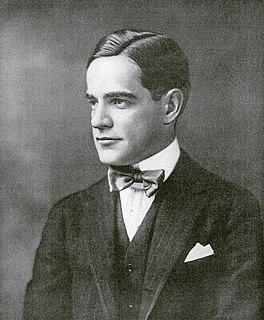A Quote by Noam Chomsky
More generally, independent farmers had to be trained to become docile workers in the expanding industrial system. It was necessary to drive from their heads evil ideas, such as the belief that wage labor was not much different from chattel slavery. That continues to the present, now sometimes taking the form of an attack on public education.
Related Quotes
Much of the present difficulty in industrial relations arises from the fact that too many employers as well as too many legislators take the Labor Leader more seriously than he deserves to be taken, while taking the ordinary, everyday, middle-of-the-road wage-earner less seriously than he deserves to be taken.
Whenever you see some business person quoted complaining about how he or she can't find workers with the necessary skills, ask what wage they're offering.
Almost always it turns out what said business person really wants is highly (and expensively) educated workers at a manual-labor wage. No wonder they come up short.
What about precarious labor? It's actually not the most efficient form of labor at all. They were much more efficient when they had loyalty to their workers and people were allowed to be creative and contribute - you know that what precarious labor does is that it's the best weapon ever made to depoliticize labor. They're always putting the political in front of the economic.
Since it is to the advantage of the wage-payer to pay as little as possible, even well-paid labor will have no more than what is regarded in a particular society as the reasonable level of subsistence. The lower ranks of labor will commonly have less, and if public relief were afforded even up to the wage-level of the lowest ranks of labor, that relief would compete in the labor market; check or dry up the supply of wage-labor. It would tend to render the performance of work by the wage-earner redundant.
In the form of security and sufficiency for the men who labor to the profit of others, and in the form of registering and controlling them in the form of an organized public supervision of their labor, slavery is already afoot. When slavery shall succeed it will succeed through the acquiescence of those who will be enslaved, for they will prefer sufficiency and security with enslavement, to freedom, responsibility, insecurity and the threat of insufficiency.
When you consider that God could have commanded anything he wanted--anything!--the Ten [Commandments] have got to rank as one of the great missed moral opportunities of all time. How different history would have been had he clearly and unmistakably forbidden war, tyranny, taking over other people's countries, slavery, exploitation of workers, cruelty to children, wife-beating, stoning, treating women--or anyone--as chattel or inferior beings.
Slavery, you know, is nothing else than the unwilling labor of many. Therefore to get rid of slavery it is necessary that people should not wish to profit by the forced labor of others and should consider it a sin and a shame. But they go and abolish the external form of slavery and arrange so that one can no longer buy and sell slaves, and they imagine and assure themselves that slavery no longer exists, and do not see or wish to see that it does, because people still want and consider it good and right to exploit the labor of others.
The family is the basic cell of government: it is where we are trained to believe that we are human beings or that we are chattel, it is where we are trained to see the sex and race divisions and become callous to injustice even if it is done to ourselves, to accept as biological a full system of authoritarian government.
If the technology cannot shoulder the entire burden of strategic change, it nevertheless can set into motion a series of dynamicsthat present an important challenge to imperative control and the industrial division of labor. The more blurred the distinction between what workers know and what managers know, the more fragile and pointless any traditional relationships of domination and subordination between them will become.
When the press writes scare stories about the global labor supply draining jobs from rich to poor places, the story is usually presented as a "race to the bottom" simply in terms of wages. Capitalism supposedly looks for labor wherever labor is cheapest. This story is half wrong. A kind of cultural selection is also at work, so that jobs leave high-wage countries like the United States and Germany, but migrate to low-wage economies with skilled, sometimes overqualified workers.
When the mass of families in a State are without property, then those who were once citizens become virtually slaves. The more the State steps in to enforce conditions of security and sufficiency; the more it regulates wages, provides compulsory insurance, doctoring, education, and in general takes over the lives of the wage-earners, for the benefit of the companies and men employing the wage-earners, the more is this condition of semi-slavery accentuated.
A few ideas seem to be agreed upon. Help none but those who help themselves. Educate only at schools which provide in some form for industrial education. These two points should be insisted upon. Let the normal instruction be that men must earn their own living, and that by the labor of their hands as far as may be. This is the gospel of salvation for the colored man. Let the labor not be servile, but in manly occupations like that of the carpenter, the farmer, and the blacksmith.



































